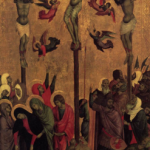It seems that we, the Catholics of the internet, could do with a refresher on a few points of theology.
“Scandal is an attitude or behavior which leads another to do evil. The person who gives scandal becomes his neighbor’s tempter. He damages virtue and integrity; he may even draw his brother into spiritual death. Scandal is a grave offense if by deed or omission another is deliberately led into a grave offense. … Scandal can be provoked by laws or institutions, by fashion or opinion. Therefore, they are guilty of scandal who establish laws or social structures leading to the decline of morals and the corruption of religious practice, or to ‘social conditions that, intentionally or not, make Christian conduct and obedience to the Commandments difficult and practically impossible.'”
—The Catechism of the Catholic Church §§ 2284, 2286
“Respect for the reputation of persons forbids every attitude and word likely to cause them unjust injury. He becomes guilty:
—of rash judgment who, even tacitly, assumes as true, without sufficient foundation, the moral fault of a neighbor;
—of detraction who, without objectively valid reason, discloses another’s faults and failings to persons who did not know them;
—of calumny [slander] who, by remarks contrary to the truth, harms the reputation of others and gives occasion for false judgment concerning them.

To avoid rash judgment, everyone should be careful to interpret insofar as possible his neighbor’s thoughts, words, and deeds in a favorable way: ‘Every good Christian ought to be more ready to give a favorable interpretation to another’s statement than to condemn it. But if he cannot do so, let him ask how the other understands it.’ … Irony aimed at disparaging someone by maliciously caricaturing some aspect of his behavior [is an offense against truth].
… Every offense committed against justice and truth entails the duty of reparation, even if its author has been forgiven. When it is impossible publicly to make reparation for a wrong, it must be made secretly. … This duty of reparation also concerns offenses against another’s reputation. This reparation, moral and sometimes material, must be evaluated in terms of the extent of the damage inflicted.
… Within modern society the communications media play a major role in information, cultural promotion, and formation. This role is increasing, as a result of technological progress, the extent and diversity of the news transmitted, and the influence exercised on public opinion. … It is necessary that all members of society meet the demands of justice and charity in this domain.
… The means of social communication (especially the mass media) can give rise to a certain passivity among users, making them less than vigilant consumers of what is said or shown. Users should practice moderation and discipline in their approach to the mass media. They will want to form enlightened and correct consciences the more easily to resist unwholesome influences. By the very nature of their profession, journalists have an obligation to serve the truth and not offend against charity in disseminating information. They should strive to respect, with equal care, the nature of the facts and the limits of critical judgment concerning individuals. They should not stoop to defamation.”
—The Catechism of the Catholic Church §§ 2477-78, 2481, 2487, 2493, 2495-97
These points most certainly apply to the Pope, for instance. Rashly passing judgment against anyone is wrong, but it is specially scandalous as applied to him as Christ’s Vicar; it can endanger other people’s faith, and our own. (1) They also apply to our neighbor: our Amazonian neighbor, for example, whose faith should not be prima facie assumed to be defective or syncretic without investigation, or on the basis of hearsay, or because their symbols are not immediately familiar to us.

And it applies to our neighbor online. Now, I am far, far more frustrated with trad and conservative Catholic sources than I am with anybody else right now. I think they are, at best, scaremongering, irresponsible, and disloyal to the Holy See for bad reasons. But giving the benefit of the doubt is built right into the Catholic approach to truthfulness and communication, as we just reviewed.
And it is only fairness to concede that, yes, I can understand why some Catholics were disturbed by what they saw of the Amazon Synod. That does not for one moment justify adopting a posture of obstinate refusal to respect the Holy Father or listen to the actual words of the Amazonian Catholics in question, let alone the breaking of a Church; on the other hand, “ultramontanist” voices like mine often evince a bad case of Suffers Newbies Poorly, and in this context, newbies doesn’t just mean fresh converts. (“But he, willing to justify himself, asked, ‘And who is my newbie?'”) The Church has betrayed a lot of expectations over the past thirty years; a lot of liturgical forms have changed, parishes have closed, centuries-old rules have been revoked, to say nothing of the abuse and financial scandals. If we ultramontanist types are honest with ourselves, we should be able to see why a person might be—well, scandalized, or at the very least confused and even frightened, by that. And I am not trying to throw shade: I felt like throwing up on more than one occasion while reading Dr Leon Podles’ Sacrilege, and I didn’t even grow up with an ingrained reverence for the priesthood and the Catholic tradition. I can only imagine what this stuff has done to someone who did. The problem with disloyalty to the Holy See is that it isn’t a real solution, not that it’s unnatural or stupid. I’d like to explore why that’s the case in my next—this one’s getting a little unwieldy as it is.
(1) This absolutely does not mean that real sins or errors of clergymen, however exalted, ought to be hidden on the pretext of “protecting the faith of the weak”: what cannot be done honestly, may not be done. It does mean that we should be particularly scrupulous about the accuracy of our facts and the way we relate them to others—in much the same way tha a weather report about a hurricane should be better researched and more carefully reportedly on than an ordinary thunderstorm, because the former can cause widespread panic or disaster or both.
Images via Pixabay












